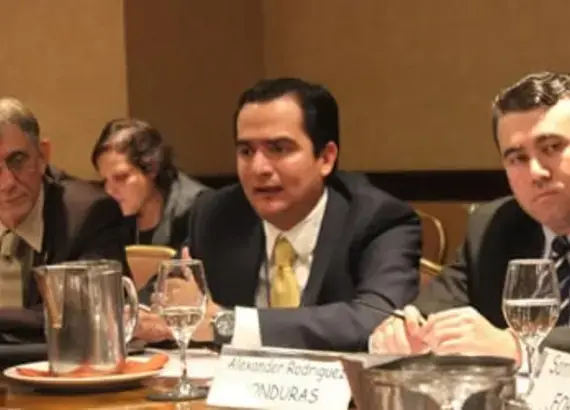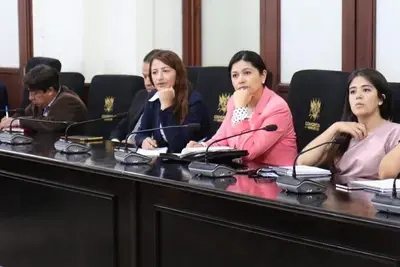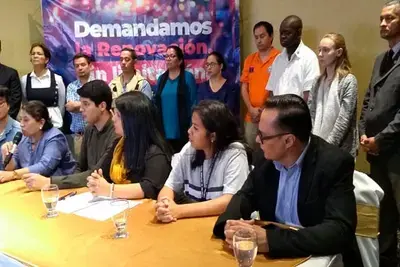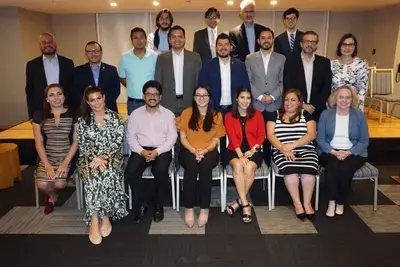
Success Story
Central American Governments Work Together to Increase Citizen Security
In northern Central America, where homicide rates are among the highest in the world, lack of security threatens the stability of democratic institutions and often stymies development. Disparities in the way El Salvador, Guatemala and Honduras approach the problem make regional security issues difficult to tackle, and organized crime and drug trafficking leaders easily cross borders based on which country has laxer procedures or laws.
In an effort to improve regional security, congressional representatives from all three countries—which make up the region known as the Northern Triangle—as well as leaders of regional organizations and the Colombian House of Representatives, met in Guatemala City Jan. 30-31. During the Interparliamentary Forum on Security Policy and Violence Prevention, hosted by NDI, participants discussed how to work together to address issues such as human trafficking, regulating private security companies, police reform, drug trafficking, organized crime, violence prevention, gender, and the trade, sale and trafficking of weapons. The forum was part of the Institute’s broader regional program, which helps political and civil society leaders at the local and national levels advocate and develop policies that address citizen security challenges.
“Violence is without a doubt a cancer that is consuming our societies, and spaces like this help us to reflect on the progress we have made in each of our countries, but mainly on the great challenges that remain,” said Pedro Muadi, president of the Guatemalan Congress, about the forum.
The forum gave leaders of the security and justice committees from Northern Triangle countries as well as representatives from different political parties the chance to discuss coordinating legislative efforts throughout the region and to learn from examples in other countries, like Colombia, which has led efforts to deal with issues like organized crime and drug trafficking.
Two regional organizations that participated, the Democratic Security Directorship of the Central American Integration System (SICA) and the Forum of Central American and Caribbean Legislative Presidents (FOPREL), are already working on regional citizen security initiatives. SICA is working to strengthen institutions and improve the skills of officials that deal with these issues, and provide examples for how to prevent violence and rehabilitate criminals. FOPREL is developing security legislation that can serve as a model for governments in the region. Thus far it has completed draft legislation on human trafficking and arms and munitions.
“With the level of organization and economic capital that organized crime has, countries cannot work independently," warned Álvaro Padilla Lacayo, a specialist in citizen security from SICA.
Participants discussed what security and justice legislation has worked for each country, and how to improve progress. For example, El Salvador hopes to capitalize on the truce brokered between the country’s two major gangs by encouraging the voluntary surrender of weapons. Honduras is trying to make gun legislation more restrictive, and Guatemala is working to improve regulation of weapons by making its classification system more specific. Guatemalan and Honduran legislators said they have made progress combatting drug trafficking with new laws that allow them to confiscate criminals’ property, and El Salvador has a law on peaceful coexistence that lays out values - such as human dignity, equality and tolerance - that people need to feel secure.
They identified common concerns - such as improving regulation of private security companies, whose operatives far outnumber national police forces, combating police corruption and addressing the growing use of technology, like cell phones, to organize criminal activity. They also stressed the importance of communicating within and among the region’s legislatures and improving coordination among branches of government. Participants said they want to continue their coordination and invest in stronger democratic institutions.
"We hope to continue gaining knowledge and experiences from these forums that will help [Honduras], which is now one of the most violent countries in the world," said Mario Pérez López, president of the Honduran Congress’ security committee.
NDI has begun a database of regional citizen security legislation and documents to share with participants, and plans to coordinate with FOPREL and SICA as well as the respective congresses to encourage more regular exchanges, including document sharing, virtual meetings and a second forum.
Read more:
Published March 12, 2013



